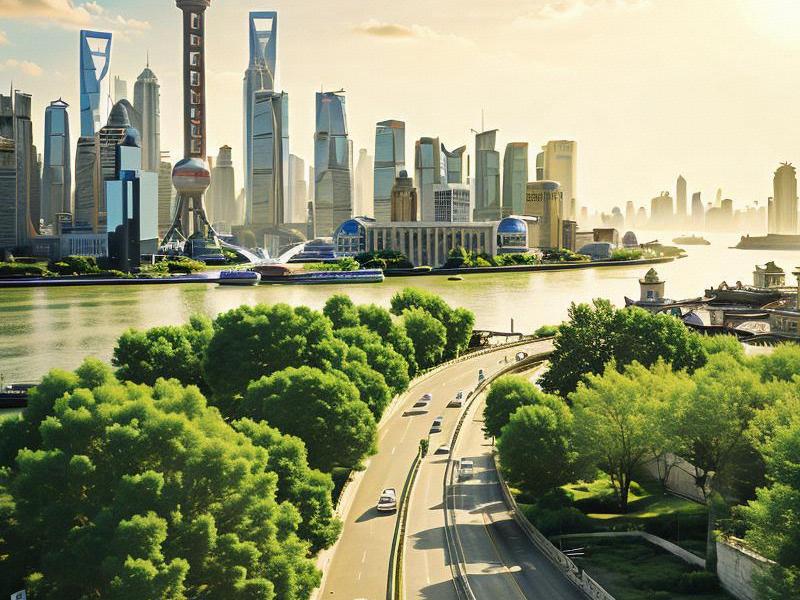
Shanghai, often referred to as the "Pearl of the Orient," stands as a beacon of China's economic and cultural progress. Situated at the mouth of the Yangtze River, this vibrant city has a rich history that dates back to ancient times, yet it is equally renowned for its modern skyscrapers and bustling urban life.
The history of Shanghai is deeply intertwined with China's broader historical narrative. Originally a small fishing village, Shanghai began to grow in importance during the Ming Dynasty (1368-1644) when it became a major port for salt production and trade. The city's strategic location made it a key point for both domestic and international commerce.
The 19th century marked a turning point for Shanghai. Following the First Opium War (1839-1842), the Treaty of Nanking was signed, which ceded Hong Kong to Britain and opened several Chinese ports to foreign trade, including Shanghai. This marked the beginning of Shanghai's transformation into a major international port city. The establishment of the International Settlement and the French Concession in the late 19th century brought about a unique blend of Eastern and Western cultures, laying the foundation for Shanghai's cosmopolitan character.
Economically, Shanghai has been at the forefront of China's development. In 1990, the Chinese government established the Shanghai Pudong New Area, a state-level new area, to promote economic reform and opening up. This initiative transformed Pudong from farmland into a modern financial district, home to some of the world's tallest skyscrapers, including the iconic Oriental Pearl Tower and the Shanghai Tower.
上海龙凤论坛419 Today, Shanghai is one of the world's largest and most important financial centers. The city hosts the Shanghai Stock Exchange, one of the busiest in Asia, and is a hub for international banking and trade. Its port, the Port of Shanghai, is the busiest container port in the world, handling millions of containers annually. The city's economy is diverse, with significant contributions from industries such as manufacturing, technology, real estate, and tourism.
Culturally, Shanghai is a melting pot of traditions and modernity. The city boasts a rich heritage of art, literature, and cuisine. The Bund, a historic waterfront area, showcases a blend of colonial architecture and modern skyscrapers, offering stunning views of the Huangpu River and the Pudong skyline. The Yu Garden, a classical Chinese garden, provides a glimpse into the city's traditional past.
Shanghai's cultural scene is thriving, with numerous museums, theaters, and galleries. The Shanghai Museum is renowned for its extensive collection of Chinese art, while the Shanghai Grand Theatre hosts a wide range of performances, from opera to contemporary dance. The city also hosts several international festivals, including the Shanghai International Film Festival and the Shanghai World Expo, which attract millions of visitors each year.
上海龙凤千花1314 Education is another area where Shanghai excels. The city is home to some of China's top universities, including Fudan University and Tongji University, which are renowned for their academic programs and research facilities. Shanghai's education system is highly regarded, producing a large number of skilled professionals who contribute to the city's economic and social development.
Shanghai's internationalization is evident in its diverse population and global connections. The city is home to a large expatriate community, with residents from over 180 countries and regions. This diversity has enriched the city's culture and contributed to its status as a global hub. Shanghai is also a member of the World Expo Cities Network and has hosted numerous international conferences and summits.
The city's infrastructure is world-class, with efficient public transportation systems, including the Shanghai Metro, which is one of the busiest in the world. The Maglev train, connecting Pudong International Airport to the city center, is the fastest commercial train in the world. Shanghai's airports, including Pudong International Airport and Hongqiao International Airport, handle millions of passengers annually, facilitating global connectivity.
上海龙凤419体验 Sustainability is a growing focus for Shanghai as it continues to develop. The city has implemented various initiatives to reduce pollution, promote green energy, and improve urban living conditions. The construction of green spaces, such as the Century Park and the Huangpu River waterfront, has enhanced the quality of life for residents.
In conclusion, Shanghai is a city that beautifully blends history, culture, and modernity. Its economic significance, cultural richness, and international connections make it a vital part of China's development and a key player on the global stage. As Shanghai continues to grow and evolve, it remains a symbol of China's progress and a testament to the potential of urbanization.
